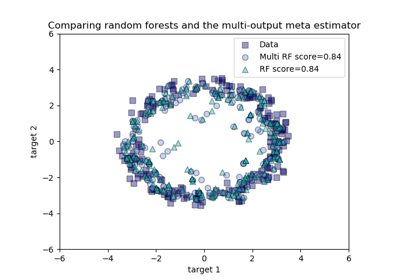sklearn.multioutput.MultiOutputRegressor¶
-
class
sklearn.multioutput.MultiOutputRegressor(estimator, n_jobs=None)[source]¶ Multi target regression
This strategy consists of fitting one regressor per target. This is a simple strategy for extending regressors that do not natively support multi-target regression.
Parameters: - estimator : estimator object
- n_jobs : int or None, optional (default=None)
The number of jobs to run in parallel for
fit.Nonemeans 1 unless in ajoblib.parallel_backendcontext.-1means using all processors. See Glossary for more details.When individual estimators are fast to train or predict using
n_jobs>1can result in slower performance due to the overhead of spawning processes.
Attributes: - estimators_ : list of
n_outputestimators Estimators used for predictions.
Methods
fit(self, X, y[, sample_weight])Fit the model to data. get_params(self[, deep])Get parameters for this estimator. partial_fit(self, X, y[, sample_weight])Incrementally fit the model to data. predict(self, X)Predict multi-output variable using a model trained for each target variable. score(self, X, y[, sample_weight])Returns the coefficient of determination R^2 of the prediction. set_params(self, \*\*params)Set the parameters of this estimator. -
fit(self, X, y, sample_weight=None)[source]¶ Fit the model to data. Fit a separate model for each output variable.
Parameters: - X : (sparse) array-like, shape (n_samples, n_features)
Data.
- y : (sparse) array-like, shape (n_samples, n_outputs)
Multi-output targets. An indicator matrix turns on multilabel estimation.
- sample_weight : array-like, shape = (n_samples) or None
Sample weights. If None, then samples are equally weighted. Only supported if the underlying regressor supports sample weights.
Returns: - self : object
-
get_params(self, deep=True)[source]¶ Get parameters for this estimator.
Parameters: - deep : boolean, optional
If True, will return the parameters for this estimator and contained subobjects that are estimators.
Returns: - params : mapping of string to any
Parameter names mapped to their values.
-
partial_fit(self, X, y, sample_weight=None)[source]¶ Incrementally fit the model to data. Fit a separate model for each output variable.
Parameters: - X : (sparse) array-like, shape (n_samples, n_features)
Data.
- y : (sparse) array-like, shape (n_samples, n_outputs)
Multi-output targets.
- sample_weight : array-like, shape = (n_samples) or None
Sample weights. If None, then samples are equally weighted. Only supported if the underlying regressor supports sample weights.
Returns: - self : object
-
predict(self, X)[source]¶ - Predict multi-output variable using a model
- trained for each target variable.
Parameters: - X : (sparse) array-like, shape (n_samples, n_features)
Data.
Returns: - y : (sparse) array-like, shape (n_samples, n_outputs)
Multi-output targets predicted across multiple predictors. Note: Separate models are generated for each predictor.
-
score(self, X, y, sample_weight=None)[source]¶ Returns the coefficient of determination R^2 of the prediction.
The coefficient R^2 is defined as (1 - u/v), where u is the residual sum of squares ((y_true - y_pred) ** 2).sum() and v is the regression sum of squares ((y_true - y_true.mean()) ** 2).sum(). Best possible score is 1.0 and it can be negative (because the model can be arbitrarily worse). A constant model that always predicts the expected value of y, disregarding the input features, would get a R^2 score of 0.0.
Parameters: - X : array-like, shape (n_samples, n_features)
Test samples.
- y : array-like, shape (n_samples) or (n_samples, n_outputs)
True values for X.
- sample_weight : array-like, shape [n_samples], optional
Sample weights.
Returns: - score : float
R^2 of self.predict(X) wrt. y.
Notes
R^2 is calculated by weighting all the targets equally using
multioutput='uniform_average'.
-
set_params(self, **params)[source]¶ Set the parameters of this estimator.
The method works on simple estimators as well as on nested objects (such as pipelines). The latter have parameters of the form
<component>__<parameter>so that it’s possible to update each component of a nested object.Returns: - self


